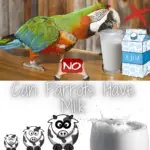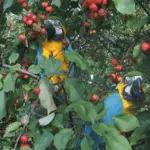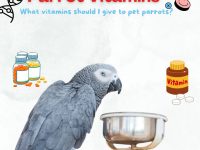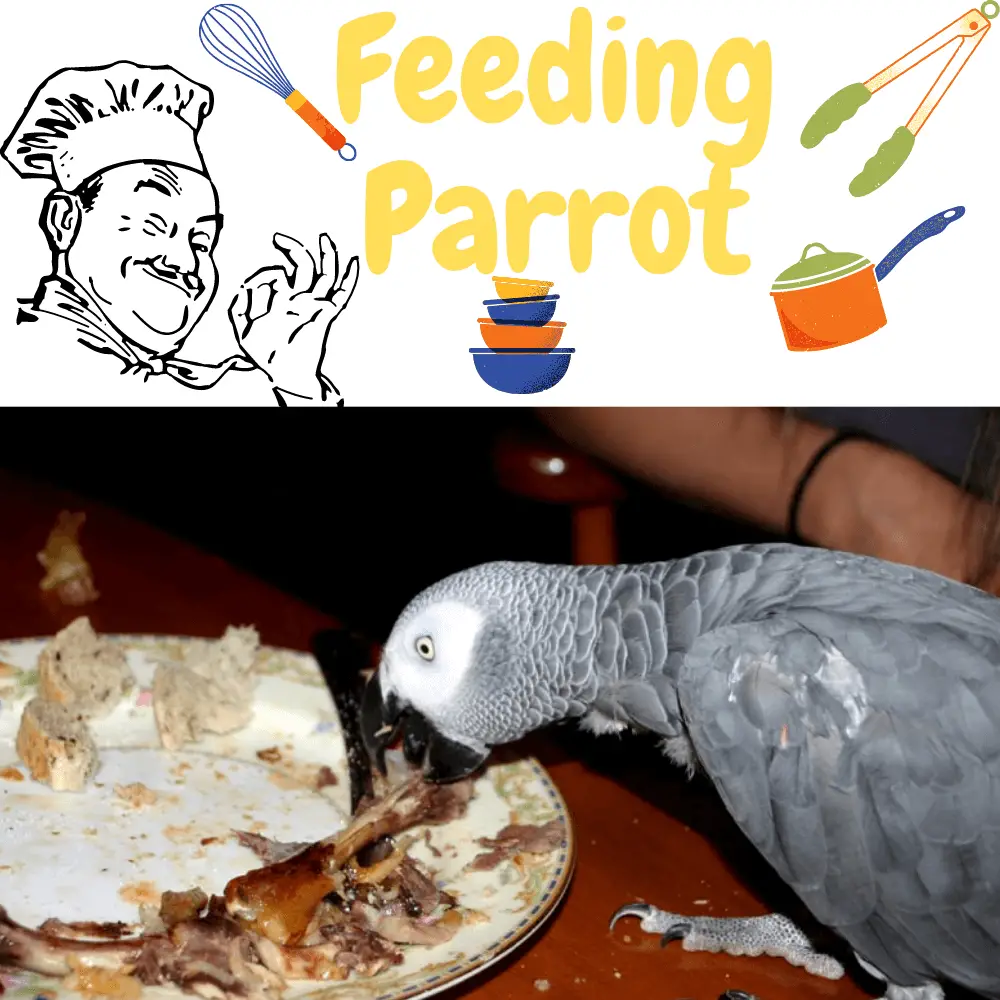
Feeding parrot Malnutrition is a silent killer that works slowly, every day. Months, even years of poor or inadequate Parrot Diet
Nutritional deficiencies are still, at the start of this millennium, along with the lack of hygiene and psychological stress, the greatest causes of disease and/or premature death in our so-called companion parrots.
can put a bird’s health at risk forever. Nutritional deficiencies are the cause of a wide variety of ailments, from dull plumage to chronic pecking, pathologies such as infections of the respiratory system, and above all, great weakness of the immune system making the bird more susceptible to infections, bacteria, and viruses as well as all problems related to reproduction.
These kinds of troubles are created by captivity … by man and only man can remedy the situation. The parrot is totally at the mercy of its human ..!
It is magical thinking to imagine that feeds ( extrusions ) or grain mixtures may be sufficient to meet the nutritional needs of your birds.
Many ( very ) uninformed people feed their parrots only with what they find in pet stores, and all too often, these foods are sold as whole foods. Although most feeds or grain mixes available on the market are of very good quality, under no circumstances should these staple foods be considered whole foods. As so aptly by Sally Blanchard: ” Asking a clerk at a pet superstore how to feed your parrot is like asking the bag boy at the grocery store how to feed your children,” which translates to: ” Ask the clerk of a great pet store how to feed your bird is like asking the packing boy at the grocery store how to feed his children well …!“(Pet Bird report no.26).
How to feed parrots
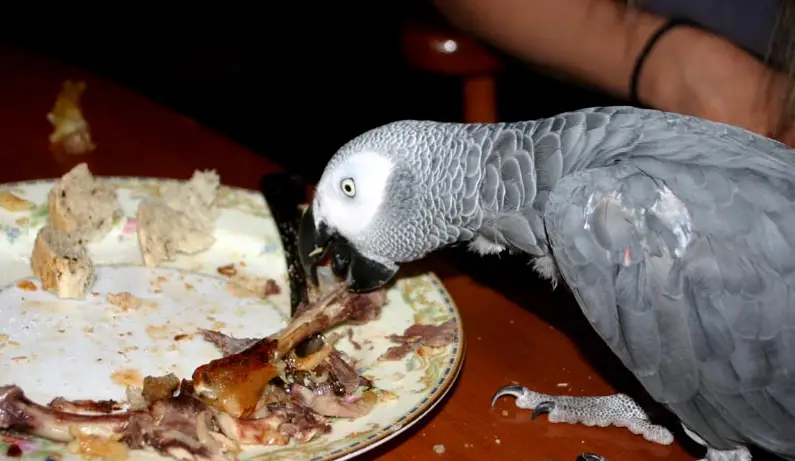
Feeding parrot
General
- Offer fresh food every day ( that goes without saying ).
- The water must be changed two (2) times a day or more ( detail for some, essential for the parrot ).
- Wash fruits and vegetables well ( with a brush ) to remove any chemical residue ( insecticides, pesticides ). You can wash your fruits and vegetables with a solution of 2 tablespoons of organic apple cider vinegar per 4 liters of water. Soak fruits and vegetables for 5 minutes, then rinse.
- Do not leave perishable food for too long within reach of your bird.
- Old grains lose a high percentage of vitamins C and E. Change them often.
- It is important to offer Coco foods rich in vitamin A and D3 and calcium.
- Make sure the food you feed your parrot is fresh. Don’t feed him what you wouldn’t dare to eat yourself.
- Hot food: soup, oatmeal, baby puree, cream of tomato, etc. No more than 106 to 108 ° F. (41-42 ° C). Below, the bird will only be interested in it moderately, above you risk severely burning the parrot’s crop.
- Be careful with food cooked in the microwave, you must mix well after the passage in the oven ( hot spots ).
- Never give food from your mouth to your parrot.
The feed / extruded / croquettes
Basic food which satisfies certain dietary needs of certain species of parrots, but which must be supplemented by all the food categories with the exception of foods on the list of ” dangerous foods “.
For:
- Less dirt, cleaner to use ( for humans ).
- Does not require the addition of vitamin supplements.
Against:
- Food ( very ) boring for the majority of psittacines ( nothing to prepare ). Do not require the addition of vitamin supplements. Several parrots refuse to eat it (of course).
- ( Very ) young and ( very ) incomplete research on the diet of parrots. Do not require the addition of vitamin supplements. Dietary deficiencies were noted in some birds fed exclusively on feed (without additional fruit, vegetables, etc.).
- It is important to watch the expiration date on the package. Do not require the addition of vitamin supplements. Bacteria can develop if the feed is soiled ( water, feces). Do not require the addition of vitamin supplements. Dietary deficiencies were noted in some birds fed exclusively on feed.
- Common avitaminosis or hypervitaminosis. Sachets quickly lose their vitamins if exposed to heat or light ( as is often the case on pet store shelves ). Do not offer a vitamin supplement to a parrot that is on a feed diet. It May cause hypervitaminosis ( vitamin poisoning ).
Feeding parrot
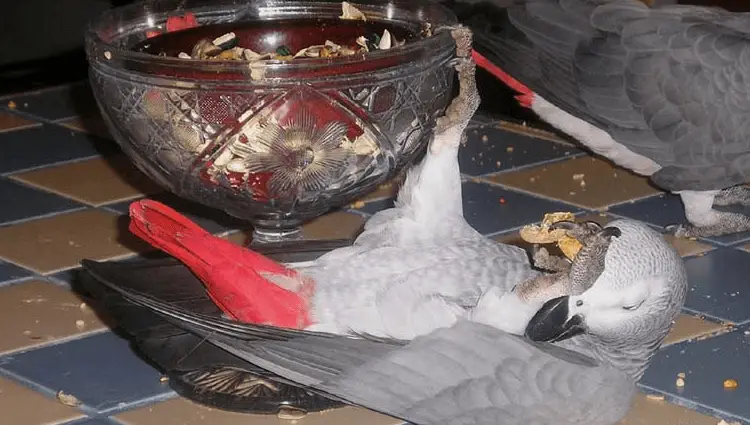
Seed mixes
Commercial mixtures for parrots ( sunflower, safflower, millet, pumpkin seeds, corn, canary seed, buckwheat, wheat, oats, sesame, etc. ).
- Grains should not make up more than 30% of the parrot’s diet. They are low in vitamins and calcium and high in fat. Birds fed exclusively on grains are exposed to serious nutritional deficiencies (see vitamins and minerals ). The grains must be supplemented by a diversified diet: fruits, vegetables, etc. Do not require the addition of vitamin supplements. The grains must be fresh ( germination can guarantee freshness ).
- Do not store the seeds in a damp place ( mold ). Does not require the addition of a vitamin supplement. Sprout grains. Parrots love it! Sprouting increases the nutrient and vitamin content and dramatically reduces the fat percentage.
- Always check food buckets that contain grains. Sometimes they can appear full and only filled with empty pods. Do not require the addition of vitamin supplements. Psittacines love careful work with their beaks. Opening and peeling the grains are pleasures that the feed does not provide. Do not require the addition of vitamin supplements. The beans should always be clean, dry, dust-free, and free from mold. They should be stored in a dry and cool place.
Dried fruits
Parrots love them, but very sweet. To be offered in moderation.
Legumes
Excellent sources of vegetable protein. Parrots prefer them cooked “al dente”.
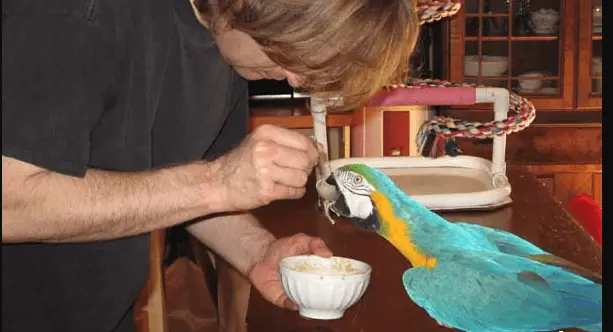
Feeding parrot
Pasta
The delight of all parrots … with the sauce of course!
Eggs
Once or twice a week, cooked and served with the shell also cooked ( to avoid ailments caused by salmonella and other bacteria ). Do not forget to vary the form of presentation ( scrambled, boiled … ).
Meats and poultry
Well done, fat-free. Bones provide a good source of calcium.
Nuts
Rich in fat, amino acids, minerals, and proteins. To be offered in reasonable quantities ( very fatty food ). Let the birds shell them on their own if possible ( depending on the size of your parrot’s beak ). Walnuts, peanuts, filberts, almonds ( rich in calcium ), pecans, pine nuts ( store them in the refrigerator ), pistachios ( rich in vitamin A and iron ), Brazil nuts, coconut, palm nuts, macadamia nuts, etc. Almonds and pistachios are the best healthy choices.
Mealworms
A delight for the birds, but frankly disgusting for us!
Dairy products
Pasteurized cheese, yogurt ( no milk or raw milk cheese ).
The cereals
Rice, couscous, bulghur wheat, barley, etc. Parrots love it!
Feeding parrot
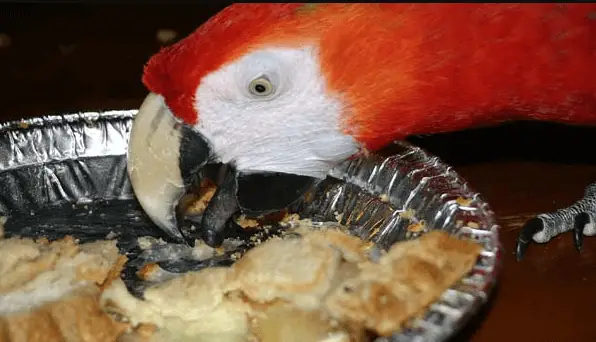
Table food
No table scraps …! The same foods that end up on your plate. Of course, it would be best if you weren’t too junk food. The key to good nutrition is variety!
Vitamin supplements
Preferably powdered. Vitamin supplements of the water-soluble type are not recommended because they are low in fat-soluble vitamins ( the valuable vitamins A and D among others ), waste away quickly, and become a breeding ground for bacteria to grow. Basically, never add vitamin supplements to parrots’ water.
Feeding parrot
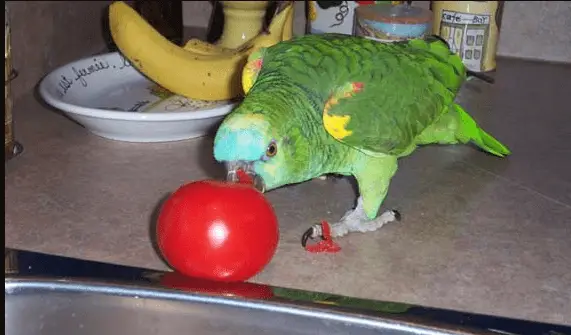
Do not put vitamin supplements in the water of parrots
- Vitamin A ( one of the most important for birds ) oxidizes in 15 minutes on contact with water ( as do all fat-soluble vitamins ). In addition, the vitamins added to the water encourage bacteria to multiply, which gives off a really foul odor.
- The unpleasant taste of water.
- Soils water very quickly ( bacteria broth ).
- Buy only the amount of vitamins you can use in 6 months.
- Vitamins lose strength and potential, especially if exposed to air.
It is important to seek the advice of a veterinarian before offering a vitamin supplement to your parrot. It is no longer rare now to see a bird suffer from hypervitaminosis ( intoxication due to the excessive absorption of vitamins ).
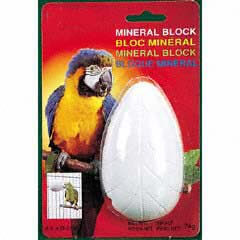
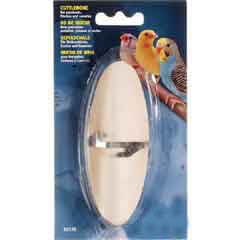
Cuttlefish bone and mineral blocks
Cuttlefish bones for birds and Bird mineral block are a good source of calcium for parrots, but not necessary.
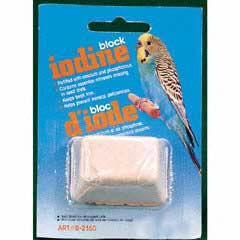
Iodine blocks for parakeets
It is important to supplement the small budgerigars with a block of iodine ( available in pet stores and inexpensive ) or an iodine supplement ( available at the veterinarian ) in order to avoid a too common problem: hypothyroidism ( goiter of parakeet ) caused by iodine deficiency.
The parrot diet: the importance of vegetables
SOURCE:Tony Silva Aviculture
Related Articles:

